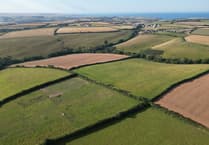A battery-powered electric train operated by Great Western Railway (GWR) has broken the world record for the longest distance travelled by a train on a single charge, an achievement that could bring faster, cleaner, electric trains to Devon and Cornwall.
The GWR train completed a 200-mile journey overnight, using just five of its six batteries and finishing with a 22% charge remaining. Engineers estimate it could have travelled another 58 miles, easily surpassing the previous world record of 139 miles set by a German train in 2021.
While gaining the world record was a bit of fun, it demonstrates the potential of battery technology as a solution for unelectrified railway lines. Overhead lines are the first choice to power electric trains, but require major investment. With much of the UK’s network, particularly in the Southwest, lacking overhead power lines, GWR has been developing this battery technology for several years. Devon and Cornwall are expected to be among the first regions to benefit from this new technology.
This breakthrough comes at the right time as GWR’s current diesel fleet, which has operated for 40 years, is coming to the end of its life and is increasingly expensive to maintain. Following this successful trial, GWR aims to replace these diesels with battery-electric trains over the next seven to ten years.
For battery trains to replace diesels, they must be able to routinely travel 60 miles between charges, and charge quickly and efficiently within existing schedules. The GWR battery trains can take up the equivalent of a full car charge in just 85 seconds, so they can charge during the three and a half minutes that trains across the UK rail network are scheduled to stop at a station, or they can charge on short sections of overhead line.
Battery trains are particularly useful for the UK’s 2,000 miles of branch lines, where installing overhead power lines would be too costly. GWR, which operates more branch lines than any other train company, sees this as a perfect fit for its many scenic routes, including the Dartmoor Line, Tarka Line and Avocet Line in Devon, and the St Ives Bay Line, Looe Valley Line and Atlantic Coast Line in Cornwall.
The new record shows that battery trains are a realistic and cost-effective option for our region, offering an 80% reduction in carbon emissions. This brings the Southwest a significant step closer to finally having a modern, electrified railway system.
The engineers who have developed the fast-charging battery train have succeeded where successive UK governments have failed over 30 years of broken promises to roll out a national electrification programme. Thanks to the innovation of these engineers, our region could benefit from faster, quieter and cleaner trains within the next decade.





Comments
This article has no comments yet. Be the first to leave a comment.